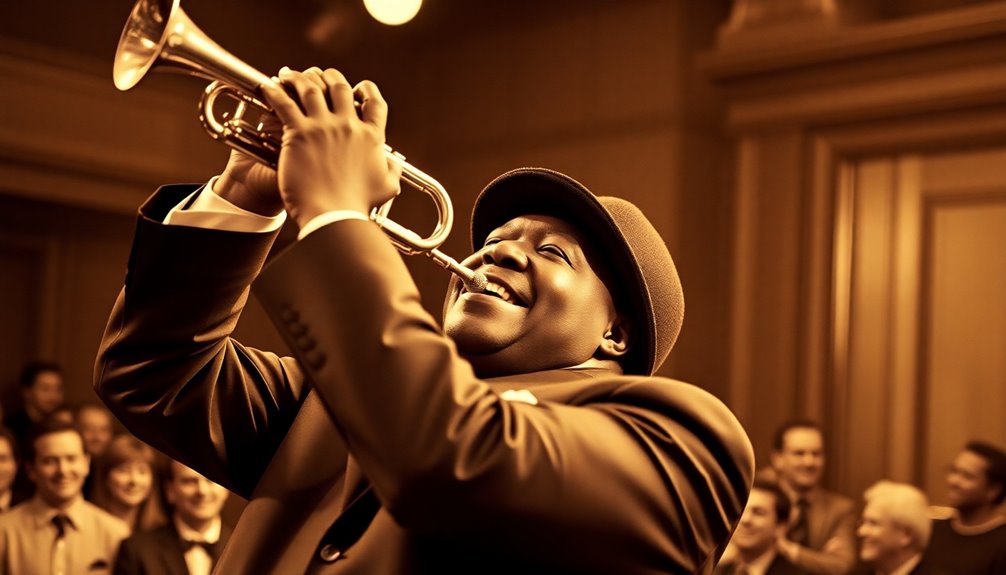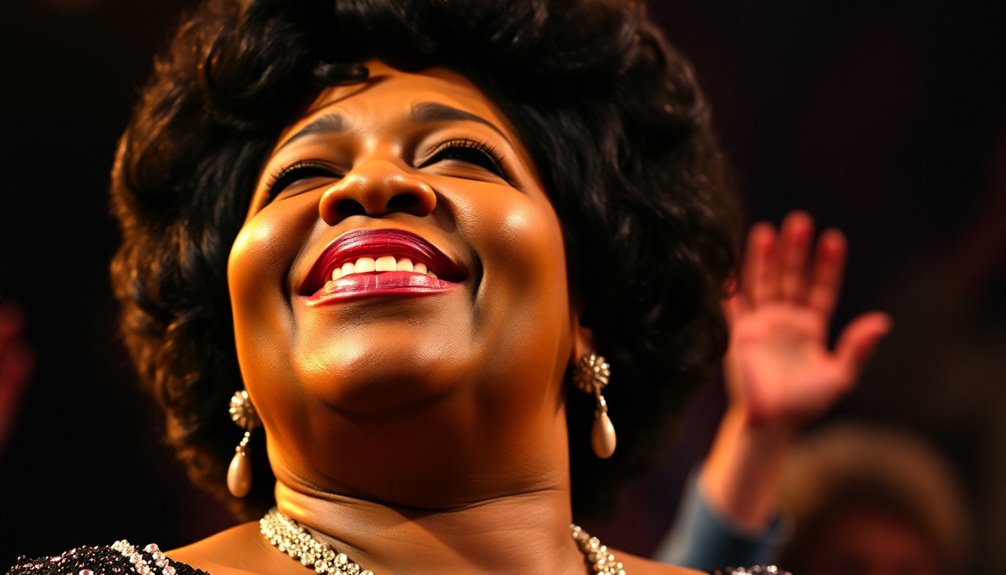When you consider music's transformation, five musicians reshape its landscape. Johann Sebastian Bach laid the groundwork with his complex compositions, driving innovation in classical music. Louis Armstrong redefined jazz with his trumpet mastery and vocal improvisation. Jimi Hendrix pushed boundaries in rock with his electric guitar prowess and unique style. Aretha Franklin's powerful voice not only dominated charts but also served as a beacon for social change. Bob Dylan's poignant lyrics inspired activism, intertwining music with cultural movements. These artists' contributions underscore their lasting impact, revealing a rich tapestry of influence that continues to resonate today. Discover more about their legacies.
Key Takeaways
- Johann Sebastian Bach: Revolutionized Baroque music with intricate counterpoint and harmonic complexity, influencing modern music structure and composition.
- Louis Armstrong: Set new standards in jazz with innovative trumpet techniques and vocal improvisation, bridging cultural divides through music.
- Jimi Hendrix: Redefined electric guitar playing and performance, blending blues, rock, and psychedelia, inspiring countless artists across genres.
- Bob Dylan: Transformed folk music with impactful storytelling and lyrical depth, becoming a voice for social movements and cultural change.
- Aretha Franklin: Celebrated for her powerful voice and influence in gospel, soul, and civil rights, her music embodies empowerment and resilience.
Johann Sebastian Bach

How did Johann Sebastian Bach manage to influence not just his contemporaries but also generations of musicians that followed? His mastery of Baroque innovations—like intricate counterpoint and harmonic richness—set a standard that composers admire to this day. You can hear his fingerprints in everything from classical symphonies to modern jazz.
Bach's ability to blend emotion and intellect in his compositions resonates deeply, inviting listeners and musicians alike into a world where technical skill meets profound expression.
Bach's musical legacy extends far beyond his own era. His works, such as the "Brandenburg Concertos" and "The Well-Tempered Clavier," showcase a complexity that challenges musicians while simultaneously offering a framework for them to explore their creativity. Additionally, his influence can be seen in the evolution of instruments, including the Western Concert Flute, which became a staple in orchestral arrangements.
You might find it fascinating how Bach's exploration of musical forms—like the fugue—has shaped the way we perceive structure in music. This isn't just a historical footnote; it's a continuous conversation in the world of music.
Moreover, Bach's influence permeates various genres, fostering a sense of belonging among musicians across different styles. When you play a piece inspired by Bach, you're not just performing notes; you're participating in a legacy that connects you to countless others who've been moved by his genius.
His ability to transcend time and genre underscores the importance of appreciating his contributions. In embracing Bach, you embrace a rich tapestry of musical history that still inspires creativity and connection today.
Louis Armstrong

In the early 20th century, Louis Armstrong emerged as a transformative figure in jazz, reshaping the genre with his innovative approach to trumpet playing and vocal style. You can see his influence not just in the notes he played, but in the very fabric of American culture. Armstrong's mastery of jazz improvisation allowed him to break traditional boundaries, making every performance a unique experience that resonated deeply with audiences.
Consider these aspects of his legacy:
- Innovative trumpet techniques: Armstrong's virtuosic skills set a new standard for jazz musicians.
- Scat singing: He popularized this vocal improvisation style, adding a playful and rhythmic element to jazz.
- Cultural ambassador: Armstrong's tours helped bridge racial divides, introducing jazz to diverse audiences worldwide.
- Influential recordings: His iconic tracks like "What a Wonderful World" continue to inspire musicians across genres.
- Charismatic stage presence: Armstrong's infectious personality drew people in, fostering a sense of community through music.
Armstrong's cultural impact extended beyond entertainment; he became a symbol of resilience during a time of racial tension in America. By breaking barriers and embracing improvisation, he not only shaped jazz but also inspired future generations to push artistic boundaries. His contributions to the genre's expression and cultural significance continue to resonate through modern music styles.
His contributions echo in today's music, reminding us that the spirit of jazz lives on. You can feel the heartbeat of his legacy every time you hear a trumpet or a soulful voice improvising in the jazz tradition.
Jimi Hendrix

Building on the transformative influence of musicians like Louis Armstrong, Jimi Hendrix redefined the landscape of rock music in the late 1960s. His groundbreaking approach to the electric guitar and musical innovation not only captivated audiences but also paved the way for future generations of musicians. You can trace his impact through his unique style, use of feedback, and innovative techniques, which blurred the lines between genres and expanded the boundaries of what rock music could be. Mastery of advanced techniques, such as vibrato techniques, can also be seen in the emotive quality of his guitar playing.
Here's a glimpse into some aspects of his influence:
| Aspect | Description | Impact on Music |
|---|---|---|
| Electric Guitar | Mastery of the instrument, using unconventional techniques | Set new standards for guitar playing |
| Live Performances | Electrifying shows with pyrotechnics and improvisation | Redefined concert experiences |
| Songwriting | Blended blues, rock, and psychedelic elements | Inspired diverse genres and artists |
| Cultural Icon | Embodied the counterculture movement of the 60s | Gave voice to a generation |
| Lasting Legacy | Influenced countless artists across genres | Continues to shape music today |
Hendrix's musical innovations, such as his use of distortion and wah-wah pedals, transformed the sound of rock and challenged musicians to think beyond conventional boundaries. Your appreciation for his work not only connects you to a rich history of creativity but also invites you to explore the ongoing evolution of music inspired by his genius.
Aretha Franklin

Aretha Franklin stands out as a monumental figure in the evolution of soul music, seamlessly blending gospel roots with R&B and pop sensibilities. As a vocal powerhouse, she didn't just sing; she poured her heart into every note, creating an emotional connection with her audience that transcended generations. Her ability to convey deep feelings through her music helped shape the landscape of soul music and solidified her legacy.
Consider the impact of her contributions:
- "Respect": This anthem became a rallying cry for both the feminist and civil rights movements, showcasing her powerful voice and undeniable presence.
- Gospel Influence: Growing up in a church, her gospel background influenced her distinctive style, bringing a spiritual depth to her performances.
- Chart-Topping Hits: With over 75 charted songs, including 17 Grammy Awards, she broke barriers and set records in an industry that often marginalized female artists.
- Cultural Icon: Aretha's influence extended beyond music; she became a symbol of strength, resilience, and empowerment for many.
- Collaboration with Legends: Working alongside artists like Otis Redding and Ray Charles, she enriched the musical tapestry of her time.
Franklin's artistry wasn't just about her voice; it was about what her music represented. You could feel her passion and pain, making her a beloved figure who brought people together through the universal language of soul music. Her contributions to musical trends not only showcased her versatility but also inspired countless artists who followed in her footsteps.
Her legacy continues to inspire new generations, reaffirming the profound impact she'd on music history.
Bob Dylan

The impact of Aretha Franklin on soul music set the stage for other artists to explore new dimensions of musical expression, and few have done so as profoundly as Bob Dylan. Emerging during the folk revolution of the 1960s, you can see how Dylan transformed the landscape of popular music with his innovative approach to songwriting. His ability to weave intricate narratives and profound social commentary into his lyrics established him as a lyrical genius, one whose words resonate on both personal and collective levels.
Dylan's work didn't just reflect the times; it shaped them. Songs like "Blowin' in the Wind" and "The Times They Are a-Changin'" became anthems for social movements, inviting listeners to engage with pressing issues such as civil rights and peace. You could argue that he brought a sense of urgency to music, pushing boundaries and challenging norms.
As you explore deeper into his discography, you'll discover how his influences spanned from traditional folk to rock, creating a unique sound that felt authentic and relatable. Dylan's willingness to experiment with genres and embrace change made him a beacon for countless artists seeking their own voices.
In a world where music often reflects the status quo, Dylan's boldness reminds you that it's possible to provoke thought and inspire action through art. His legacy is a reflection of the power of music as a vehicle for change, urging you to listen, reflect, and connect. As he demonstrated through his evolution, consistent practice schedules are essential for artists aiming to hone their craft and influence the world around them.
Frequently Asked Questions
What Instruments Did Each Musician Primarily Play?
When you explore what instruments each musician primarily played, you'll notice how their guitar techniques and instrument innovations revolutionized their genres.
For instance, one artist might've mastered fingerpicking while another focused on strumming patterns that defined a sound.
Each musician's choice of instrument not only shaped their style but also inspired countless others.
How Did Their Personal Lives Influence Their Music?
You'll find that personal struggles often shape an artist's music profoundly. Their experiences—whether heartbreak, loss, or triumph—fuel emotional expression, allowing you to connect deeply with their work.
For instance, the raw honesty in their lyrics often reflects their life challenges, making their art resonate with your own feelings. By embracing vulnerability, these musicians create a sense of belonging, inviting you to share in their journey and find solace in shared experiences.
What Were Their Biggest Hits or Most Famous Songs?
When you think about their biggest hits, you can't help but recall those iconic anthems that defined generations.
These artists crafted chart-topping singles that resonated with listeners on a deep level, reflecting their experiences and struggles. Each song became a soundtrack for moments in life, connecting you to a larger community.
Their ability to blend personal stories with universal themes created music that not only entertained but also united people through shared emotions and memories.
Did They Collaborate With Other Notable Artists?
You'll find that collaboration styles among artists often define their sound and impact.
Many notable pairings create magic by blending genres and techniques. For instance, when artists team up, they not only enhance each other's strengths but also introduce fresh perspectives that resonate deeply with audiences.
These collaborations can produce groundbreaking tracks that become anthems, inviting listeners to connect and celebrate the shared experience of music.
It's a powerful reminder of the unity in artistry.
What Awards Did They Receive During Their Careers?
Throughout their careers, they've received numerous awards, highlighting their exceptional talent and influence.
The Grammy Awards stand out, celebrating their contributions to music across various genres.
Beyond these accolades, many have earned Lifetime Achievement Awards, recognizing their lasting impact on the industry.
These honors not only validate their hard work but also connect you to a community that appreciates artistry and excellence, reminding you of the power of music to inspire and unite.
Conclusion
As you stand at the crossroads of music history, the echoes of Bach's intricate melodies, Armstrong's vibrant jazz, Hendrix's electrifying riffs, Franklin's soulful anthems, and Dylan's poignant lyrics guide your path. Each musician, like a masterful painter, has colored the canvas of sound, creating a rich tapestry that resonates through time. Their legacies remind you that every note and lyric holds the power to inspire change, shaping the world's heartbeat in ways you might not even realize.





